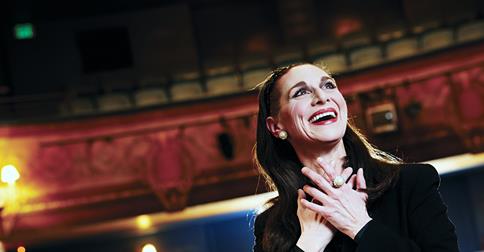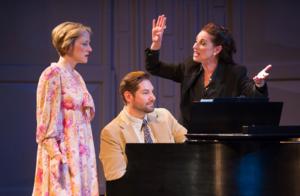

Milwaukee Chamber Theater kicks off its 2014-15 season by reviving one of its greatest hits, Terrence McNally’s Master Class. The theater company is to be applauded for bringing back local actor Angela Iannone to star in a part that has become her signature roll. This production marks Iannone’s eighth incarnation of opera legend Maria Callas, on which the play is based. Over the years, Iannone has appeared in productions of “Master Class” throughout the Midwest. But this is her first chance to play Callas in Milwaukee in 15 years.
Ironically, the 2011 Broadway revival of Master Class also starred someone with local connections. Actress Tyne Daly, who played Callas in the Manhattan Theater Club production, was born in Madison (about a 90-minute drive from Milwaukee). Going back to the original cast, Zoe Caldwell won a Tony Award for her sizzling performance as Callas in the mid-1990s.
Callas is, without a doubt, one of the juiciest roles out there for older actresses. In McNally’s play, Callas is conducting master classes at Juilliard after her performing career ends. Callas allows a few students to sing for her, after which she is supposed to give them a critique of their abilities.
The play’s clever conceit is that Callas addresses the audience as if they also were aspiring opera students. In fact, within the first few minutes, Callas makes it clear to the audience what her expectations are for them as well as the students (whom she refers to as “victims”) who will perform for her. “Are you scared?” she asks each of them as they enter the “classroom.” If the answer is yes, Callas seems amused. “Well, you should be,” she responds, dryly.
The play is an excellent primer on the artistic process, as told by one of the greats – or perhaps, the greatest opera performer of all time. Callas shares her opinions openly, and they range from the back-stabbing nature of the performing arts to her impressions of other prominent opera figures, such as the late Joan Sutherland and the late Luciano Pavarotti. Callas makes it clear to her new charges that opera demands intense preparation and attention to the smallest of details. She even derides one student for not bringing a pencil to write notes in her copy of the score. It leads Callas to muse on her own youth when, as an aspiring student, she had only enough money to buy a pencil – or an orange. The pencil always won out, despite Callas admitting her fondness for oranges. Iannone has been called “a force of nature” as the tempestuous Callas, and this reviewer doesn’t disagree with this sentiment. To make Iannone appear more intimidating as Callas, her make-up sharpens the features of her face. It’s clear from the show’s beginning that Callas is almost bored with the classroom situation. She treats her accompanist (an excellent Brian Myers) and a stagehand (an accommodating James Fletcher) with an imperious, dismissive tone. One can only wonder what she’ll unleash later on her students. Even as the brave students begin to perform, it’s clear that Callas prefers to live in an inner world, recounting her past triumphs. Her musings are illustrated by Chris Guse’s projections that show a stage view of the world’s great opera houses. As Callas goes deeper and deeper into her memory, the images start out as sketchy black and white drawings, eventually morphing into full-color, strongly lit projections. It’s an excellent effect that enhances the audience’s understanding of Callas’ brilliant career. Despite her taking a superior tone for most of the show, Iannone also produces a great deal of sympathy for Callas. Audiences can relate when Callas talks about being the “ugly, fat sister” whose rival was charming, golden-haired and favored by both their parents, not to mention boys. Callas grew up poor, and her stories of deprivation are heart-wrenching. If anything, she says, it made her more determined to get revenge on those who thought she would never get anywhere in the opera world. Master Class also dips into Callas’ adult personal life, particularly in scenes with her lover, Aristotle Onassis. Callas plays both roles as she recreates conversations with Onassis (who apparently hated opera). One can see Iannone almost wilt when Onassis asks her to degrade herself by singing a barroom song for him. Although Callas made significant sacrifices to entice Onassis into marrying her, he eventually throws her over for Jacqueline Kennedy. Callas’ students play an important, if fleeting, role in the show. Callas’ sharp tongue manages to reduce the women (Melissa Cardamone, Alicia Berneche) to tears – or worse. Callas takes more of an interest in a tenor (Edson Melendez) who rekindles her memories of the onstage suitors to her various heroines. In retaliation, one of the female students eventually shoots back at her. She attributes Callas’ bad behavior to the fact that she “can’t sing anymore.” The girl – who showcases her stunning voice during an aria – may well be right.
While prospective ticket buyers may be concerned about the show’s appeal to non-opera buffs, never fear. The feeling will vanish as soon as Iannone walks onstage. Her riveting performance comes across regardless if one is an opera lover or a complete alien to that world. Even the frequent snippets of dialogue in Italian can’t break the spell between Iannone and the audience. It would be a shame to have to wait another 15 years before Iannone reprises this role, so the time is now to buy tickets and enjoy an amazing evening.
